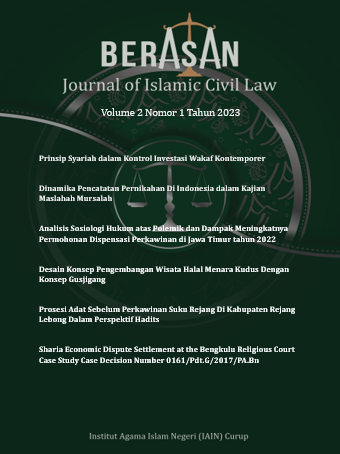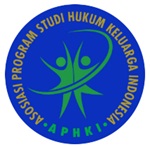Prosesi Adat Sebelum Perkawinan Suku Rejang Di Kabupaten Rejang Lebong Dalam Perspektif Hadits
DOI:
https://doi.org/10.29240/berasan.v2i1.6595Keywords:
Marriage, Rejang, HaditsAbstract
The study aims to determine the traditional procession before the marriage of the Rejang tribe in  Rejang Lebong Regency in the perspective of hadith. The method used in this study  is qualitative research with library data sources using qualitative descriptive analysis techniques. The results of this study, first, the traditional procession before the marriage of the Rejang tribe began from mediak, bekulo, betunang, and sembeak sujud, majok sematen / bakea mengenyan, and deliberation in determining the place of residence after manikah and determining the status of congenital property.  The two traditional processions before the marriage of the Rejang tribe when viewed in the perspective of hadith t are in line with Islamic teachings, such as mediac  customs, namely the introduction of bachelors and girls to the Rejang tribe, such as ta'aruf whose implementation must pay attention to ethical norms in Islamic associations, bekulo and betunang customs are identical to khitbah activities, the custom of prostration There is an element of learning ethics and manners in communicating for brides-to-be in everyday life and the custom of determining the place of residence after manikah and determining the status of property is carried out by deliberation. The interaction of Islam with the Rejang culture at the ceremony before the wedding and the tools used in the ceremony have been acculturation, accomodation and integration. As the beginning of the activity begins  with the recitation of the basmalah and the ceremony ends with the recitation of the congratulatory prayer.
Downloads
References
Abdullah Siddik, Hukum Adat Rejang, Jakarta : Balai Pustaka, 1980
Departemen Pendidikan dan Kebudayaan Provinsi Bengkulu, Adat Dan Upacara Perkawinan, Bengkulu: DEPDIKBUD, 1983
Chairudin Husin, Nilai-Nilai Dakwah Sebelum Adat Perkawinan Pada Suku Rejang, Curup : Skripsi Pada Jurusan Dakwah STAIN Curup, 2008
Jalaluddin as-Suyuthi, al-Ashbah wa an-Naza’ir, Beirut, Dar al-Fikr,tt
Muhammad Khalid Mas‟ud, Islamic Legal Philosophy, A Study of Abu Ishaq as-Syatibi’s Life and Thought, alih bahasa Ahsin Muhammad Bandung: Pustaka, 1996
Lexi Moloeng Metodologi Penelitian Kualitatif, Bandung: Remaja Rosda Karya 2000
Kadiman, Ireak Ca’ o Kutei Jang, Jakarta : Balai Pustaka, 2004
Zayadi Hamzah, Islam Dalam Perspektif Budaya Lokal : Studi Kasus Tentang Ritual dan Siklus Kehidupan Keluarga Suku Rejang Di Kabupaten Rejang Lebong Propinsi Bengkulu Jakarta : Disertasi Doktor UIN Jakarta, 2010
Syahril Chili, dkk, Kamus Rejang-Indonesia, Jakarta : Gramedia, 2003349
Downloads
Published
Issue
Section
Citation Check
License
Authors who publish with Berasan: Journal of Islamic Civil Law agree to the following terms:
- Authors retain copyright and grant the journal right of first publication with the work simultaneously licensed under a Creative Commons Attribution-NonCommercial-ShareAlike 4.0 International License (CC BY-NC-SA 4.0) that allows others to share the work with an acknowledgment of the work's authorship and initial publication in this journal.
- Authors are able to enter into separate, additional contractual arrangements for the non-exclusive distribution of the journal's published version of the work (e.g., post it to an institutional repository or publish it in a book), with an acknowledgment of its initial publication in this journal.
- Authors are permitted and encouraged to post their work online (e.g., in institutional repositories or on their website) prior to and during the submission process, as it can lead to productive exchanges, as well as earlier and greater citation of published work (See The Effect of Open Access).









